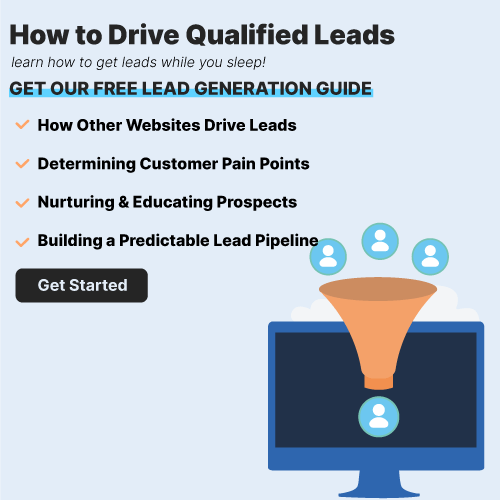Greetings, home builders! Seeking to build a stronger online presence and reach more potential clients? Look no further, as we’ve put together a guide to the top 47 home builder websites.
Our team of web development experts has meticulously searched the web to find and evaluate the best home builder sites based on design, functionality, uniqueness, and user experience. From well-designed and inviting layouts to seamless navigation, these sites are the epitome of excellence in the home building world.
Not only will you find inspiration for your own website, but you’ll also discover valuable tips on how to make your online presence stand out from the crowd.
Grab your tool belt and get ready to construct a stronger online presence with the help of this guide! You’ll find website examples of custom home builders, production home builders, renovation & remodeling contractors, green home builders, and modular & manufactured home builders in this list! For examples within other business sectors, head back to our top ranked website designs blog article!
Top Home Builder Website Designs
1. Highland Custom Homes
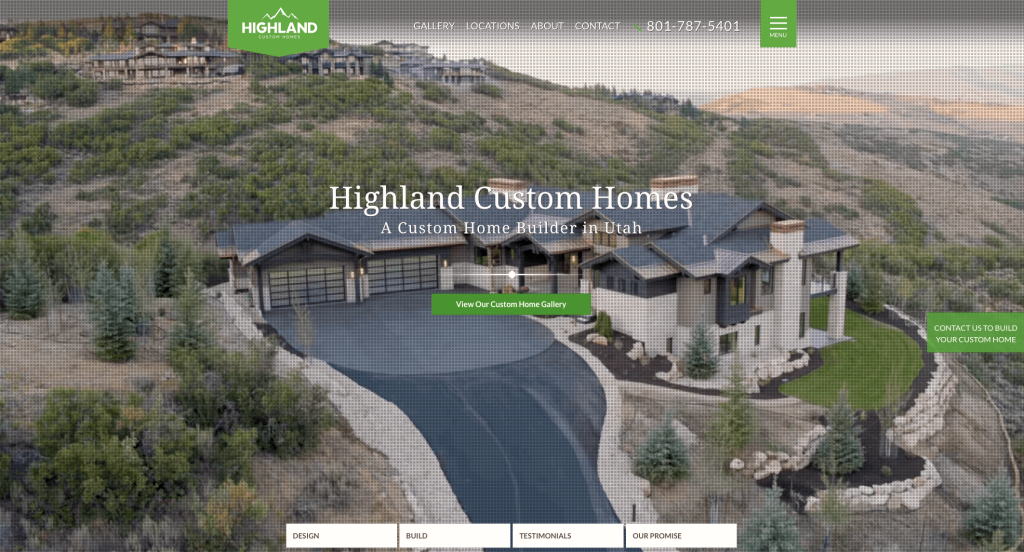
This is a great home builder web design example for anyone looking for a professional look and feel for their website. The creative background graphics was probably the most impactful quality in the homepage of Highland Custom Homes. Another thoughtful feature of this clean home builder website was their simple contact information. Highland Custom Homes had website accessibility in mind when building the green accents for their website. These were just a few of the numerous qualities in this website to consider while we were putting together this list of top websites for home builders.
2. Westpoint Development
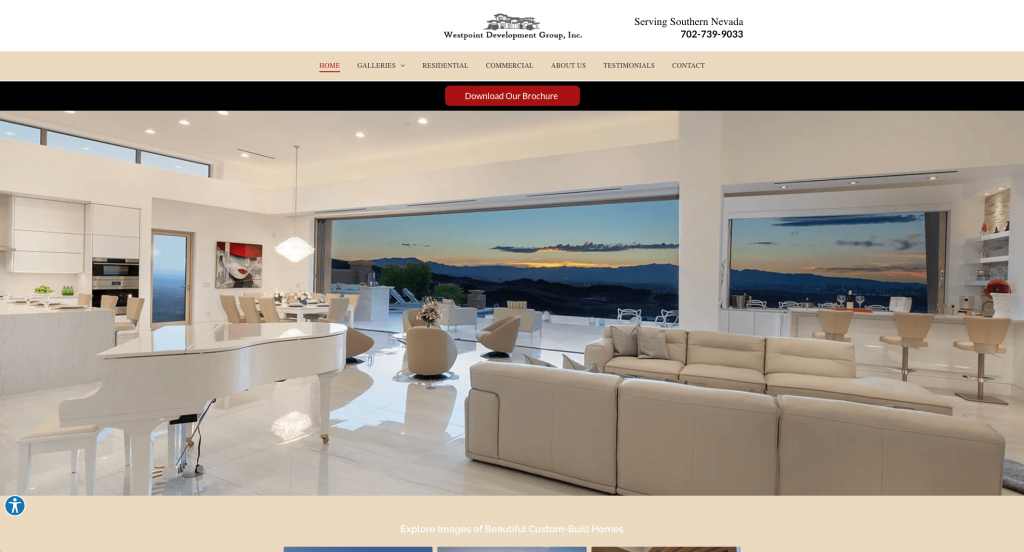
Sporting a clean and intuitive layout, this website keeps things simple for a home builder site. After scrolling past the header of this home builder site, you’ll notice their high-quality visuals. Another thoughtful feature in this creative home builder website was their template that was free of distractions. They clearly had ease of use in mind when building the clearly labeled menu for their website. Give some thought to the unique design of this home builder website when developing your next custom website.
3. DC Builders
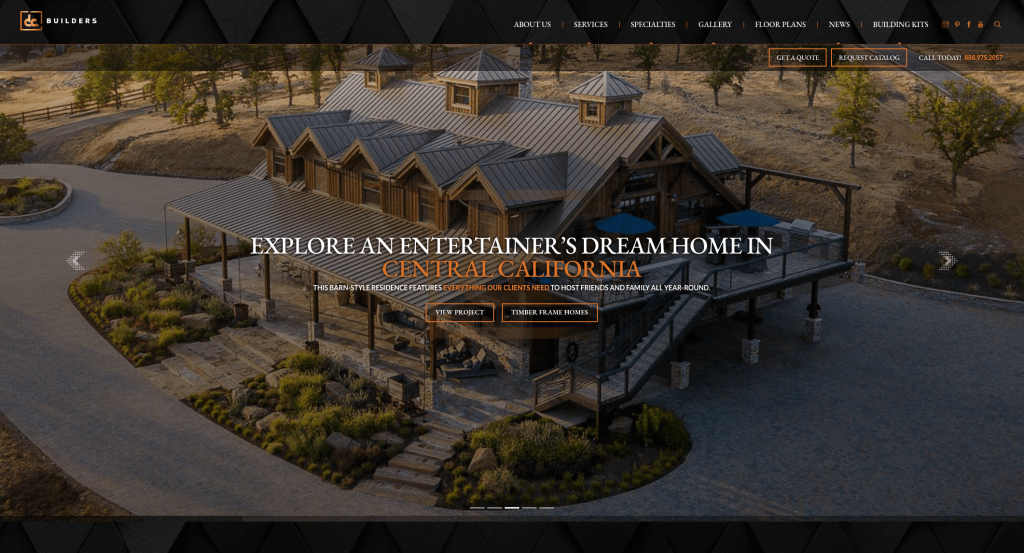
The black, orange and white color palette they choose for this home builder website stood out to us because it creates a strong and bold feel. As you scroll through the homepage, one of the design qualities you’ll see is the gallery of their finished homes. Another thoughtful feature in this clean home builder website was their domain for their website that matches their company name. DC Builders clearly had website accessibility in mind when designing the customer testimonials area for their website. Don’t forget to check this website out while looking through our list of the best home builder website layouts!
4. Harvest Homes
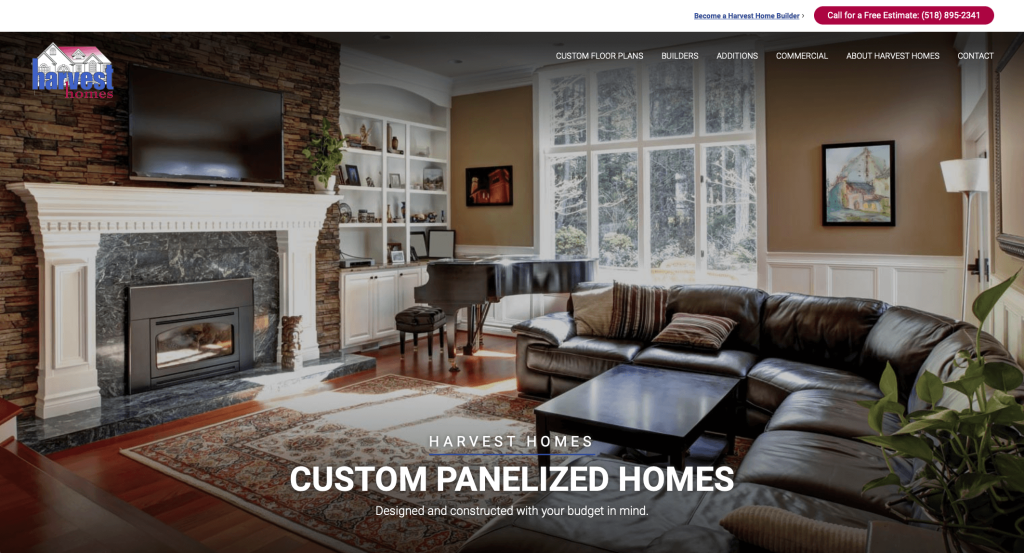
We quickly noticed the red, blue and white color scheme for the Harvest Homes website, which we liked because it doesn’t distract viewers. Our web designers thought this website was a good example for builders because of their layout that was free of distractions. The well-labeled navigation bar was a nice touch for a professional website. Their different sized imagery helped make this one of the top home builder websites we reviewed. For home builders looking for examples for their next website layout, this design example will absolutely be one to take a look at.
5. Atmos
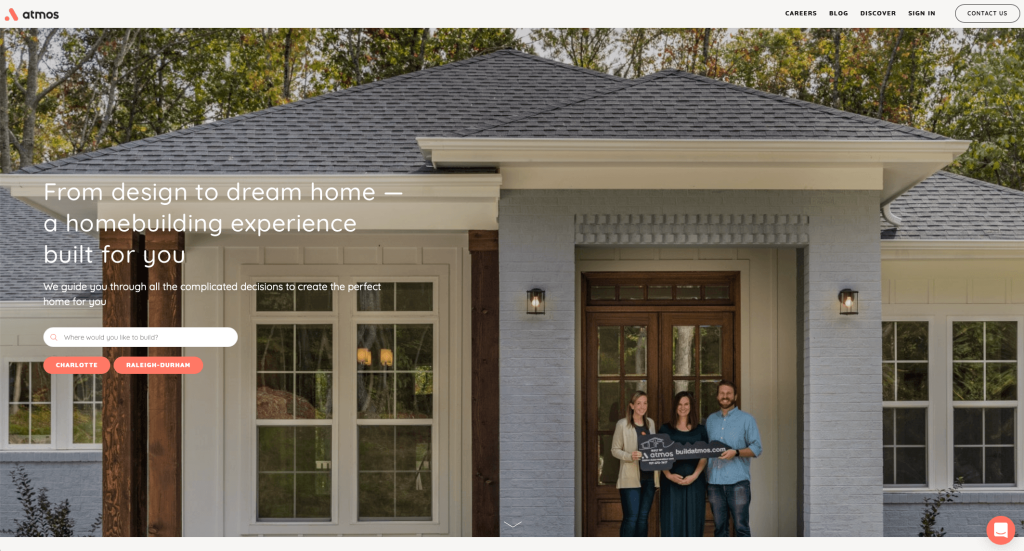
This is a great home builder web design example for someone looking for a professional layout. After scrolling past the header of this home builder website, you’ll notice their simple logo design. Another design quality in this creative home builder site was their survey to help understand what type of home you are interested in. From a marketing point of view, we liked the way this home builder website utilized creative graphics. Be sure to consider the great design of this home builder website when building your next website.
6. CBH Homes
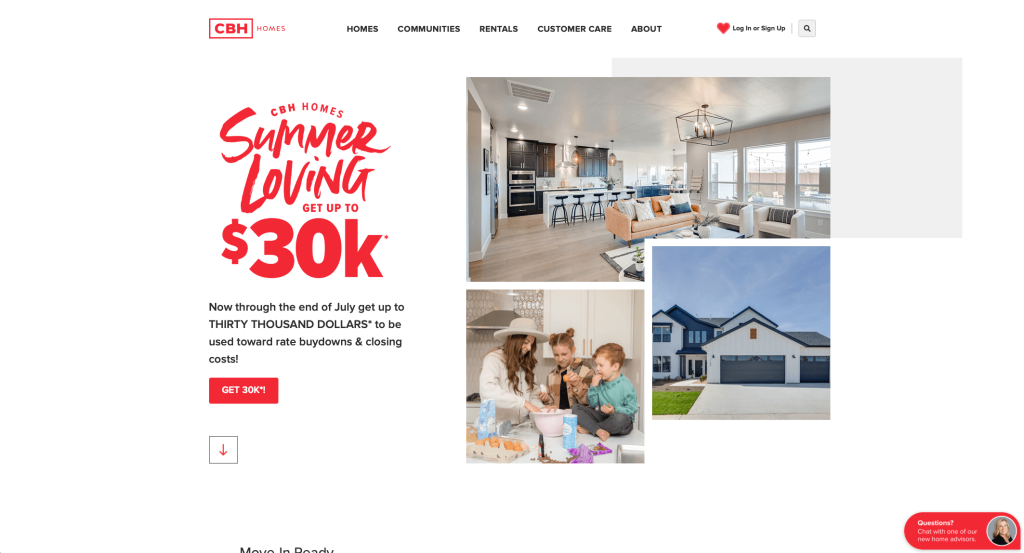
The CBH Homes website has a very professional feel to it, thanks to its unique use of black, white and red. As you scroll through the homepage of the website, one of the design qualities you’ll notice is their unique font. Another feature in this professional home builder site was the clearly labeled information on homes. CBH Homes clearly had a focus on ease of use when creating the navigation bar with organized categories for their website. Any website designer mocking up websites for home builders will want to consider checking this website out.
7. C&M Home Builders
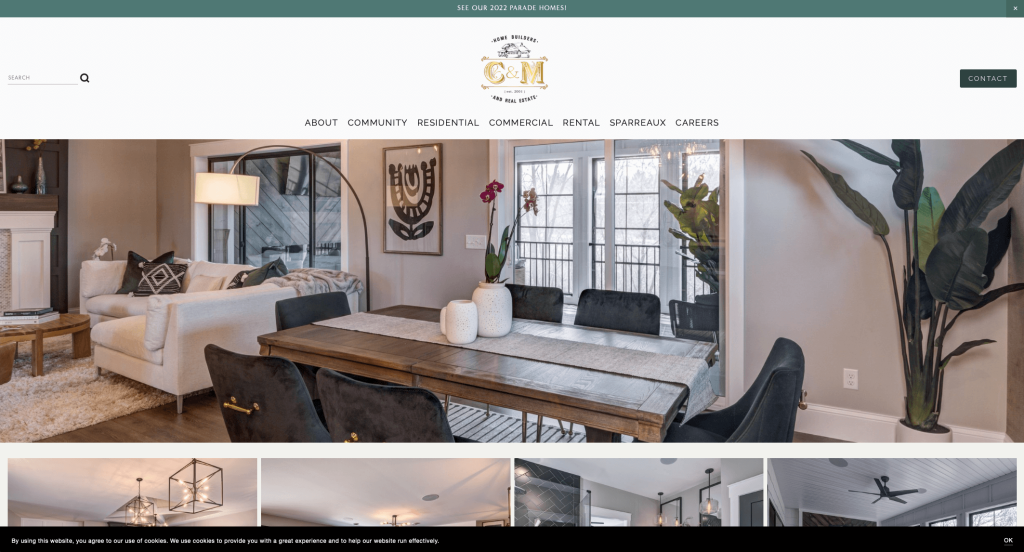
This is a good example of a website design for home builders looking for a professional website. After scrolling past the navigation of this builder website, you’ll immediately notice the optimized content. The organized flow of information was a nice touch for a unique home builder site. C&M Home Builders clearly had internet marketing in mind when creating the balance of white space throughout their website. If you are looking for template options for your next home builder website, be sure to check this one out.
8. Latala Homes
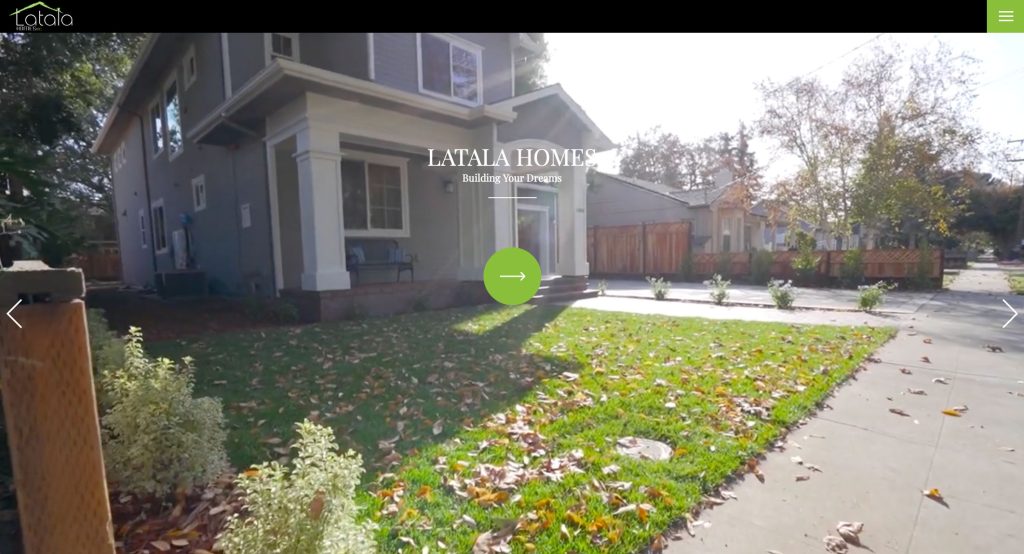
For a home builder website, they did a great job utilizing the green, white and black colors throughout their site. Of all the professional home builders websites we reviewed, one of the features in this custom website we liked was their simple and thought-provoking logo design. Another feature seen in this professional home builder site was their use of images for background images. Latala had digital marketing in mind when creating the the simple contact information for their website. Don’t scroll past this website when hunting for design ideas for your next home builder website!
9. Xhema
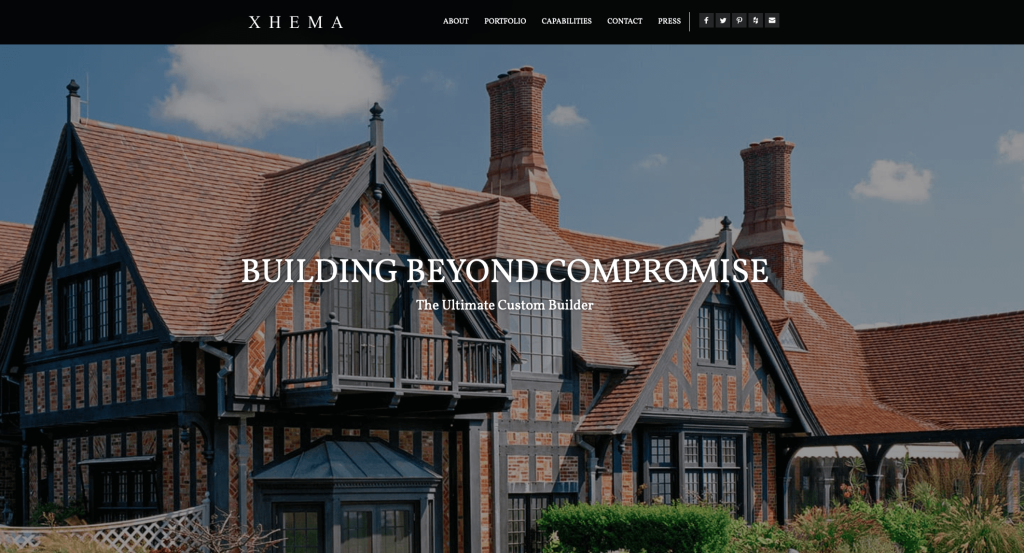
Sporting a clean and intuitive layout, this site keeps things simple for a home builder website. One of the homepage features of Xhema we noticed was the gray banners to break up content because it was rather refreshing for a home builder website. Another feature seen in this professional builder site was the clearly labeled menu. They clearly had a focus on internet marketing when creating the quality information for their website. Give some thought to the one-of-a-kind design of this home builder website when developing your next website.
10. KB Home
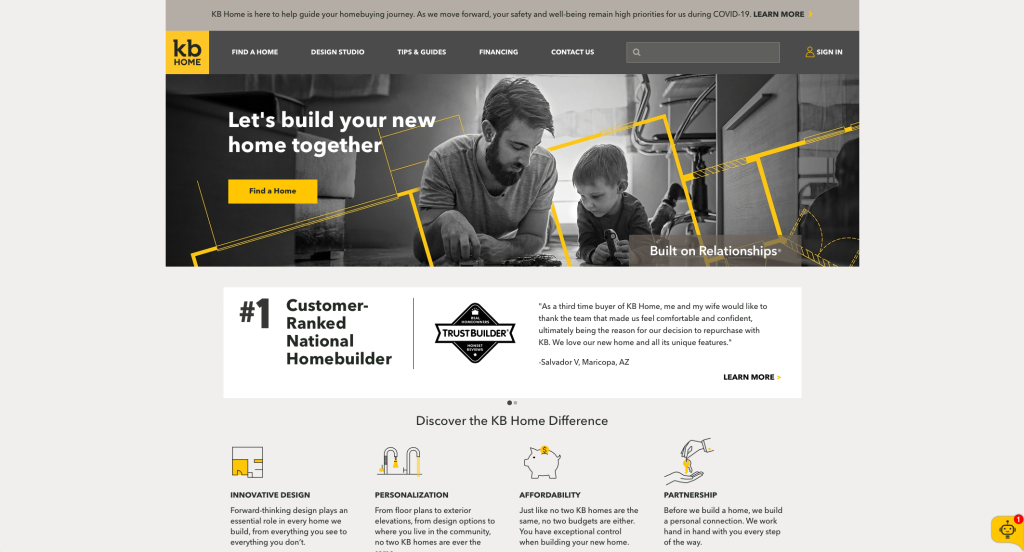
This is a creative website design example for a home builder looking to create their next custom website. Our web designers thought this website was a good template idea for home builders because their balance of content between text, graphics and images. Another feature in this custom home builder website was the buttons to enhance usability. They had conversions in mind when building the yellow accent color for their website. What a great website to review when building out your next home builder website!
11. QualMax
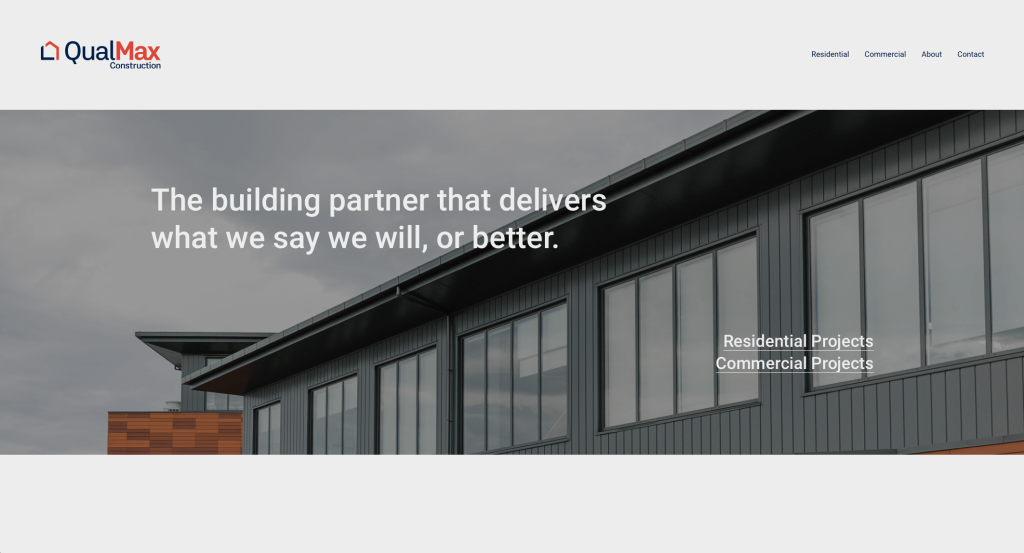
This is a good website example of a website design for home builders looking for a custom site layout. After scrolling past the header of this builder website, you’ll notice the large imagery. The simplistic template was a good choice for a unique website. They clearly had ease of use in mind when designing the domain for their website that matches their company name. With so many good reasons to consider this home builder website, it’s no wonder we included it in this list of the best websites!
12. Toll Brothers
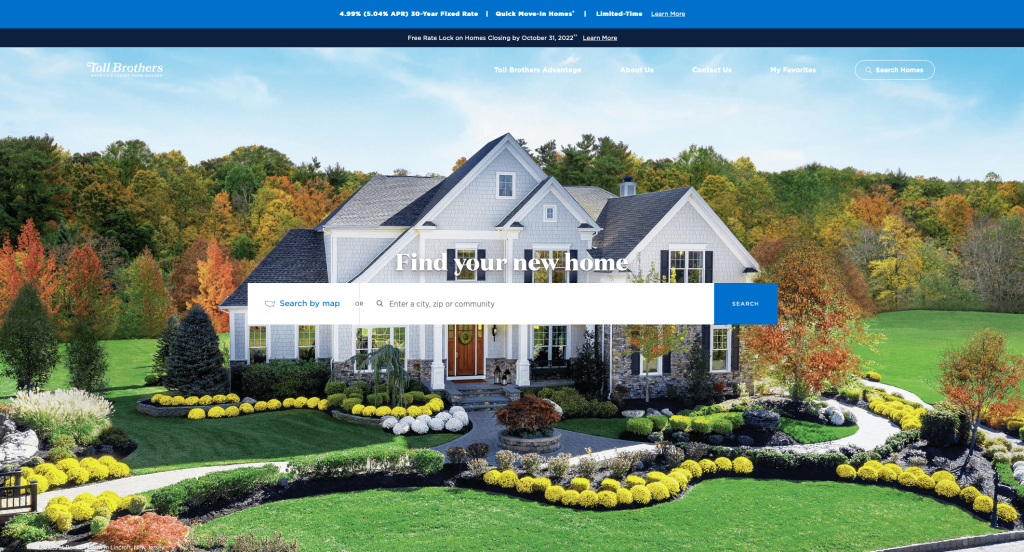
The Toll Brothers website has a very professional feel to it, thanks to its unique use of white, blues and orange. One of the homepage features in Toll Brothers we noticed was the search bar to help you find your home based off community, city or state. Another thoughtful feature of this creative home builder website was the map showing where they build homes. They clearly had a focus on internet marketing when designing the simple icons for their website. Another amazing website to add to this list!
13. Tri Pointe Homes

The white, gray and lime green color palette in this custom home builder site stood out to us because it created a clean feel with a well chosen accent color. One of the homepage features of Tri Pointe Homes we noticed was their high-quality images. Another thoughtful feature seen in this custom home builder website was their bulleted information. They clearly had internet marketing in mind when creating the lime green tabs showing which houses were move-in ready, when they are move-in ready, and now selling homes throughout their website. Be sure to consider the unique design of this home builder website when developing your next website.
14. Martell Builders
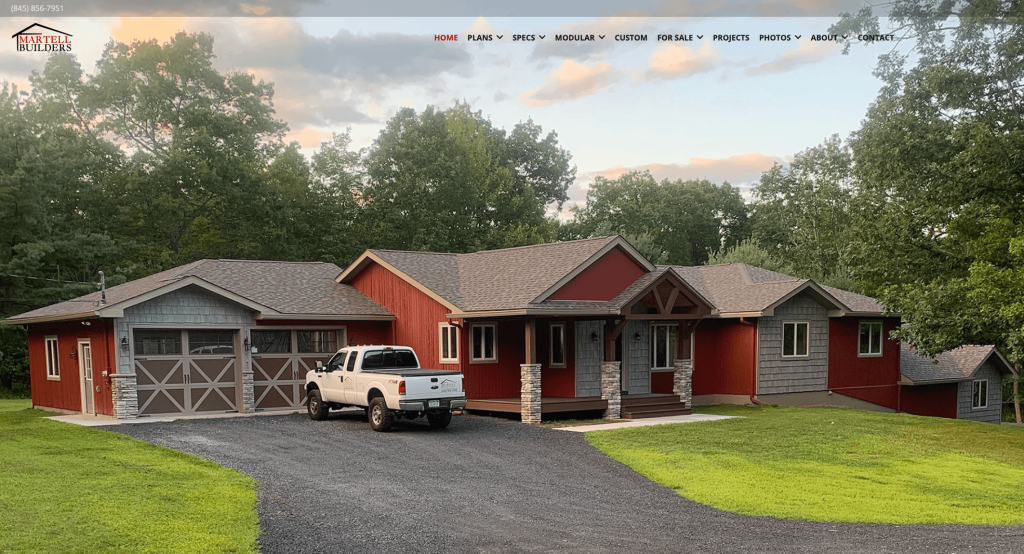
The black, white and red color palette of this home builder website stood out to us because it looked great when there wasn’t images and when large images covered much of the screen. Our web designers thought this was a good example of a homepage layout for builders because of the navigation bar with more precise categories. The quality content was refreshing for a professional home builder website. They had digital marketing in mind when creating the client review section for their website. If you are looking for template ideas for your next home builder site, give some thought to this one.
15. BH Design & Build
Related: Paid advertising can be an effective way to reach prospective clients looking to build a future home.
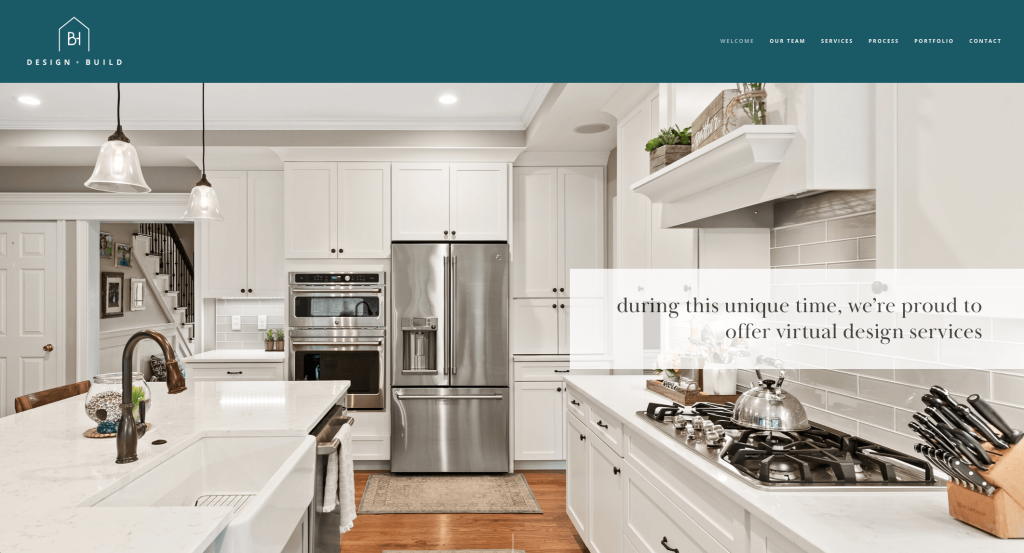
There were a lot of home builders to choose from, but the website of BH Design & Build was a great example of a nicely organized website with a blue, black and cream color scheme. The color blocks to separate content was definitely the most impactful feature in the homepage of BH Design & Build. Another design quality we noticed in this custom home builder website was the clearly labeled menu. BH Design & Build clearly had a focus on digital marketing when creating the thoughtful logo for their website. For home builders looking for ideas on their next website, this example will definitely be one to consider.
16. Housebrand
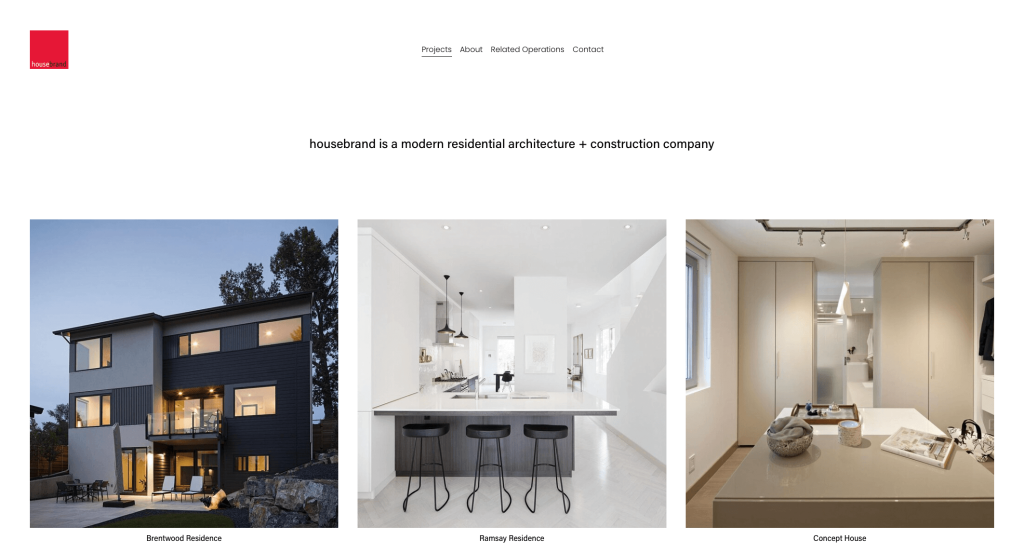
This is a good example of a website layout for a home builder to check out when looking for inspiration for their next custom web design. The display of their previous projects was definitely the most impactful feature in the homepage of Housebrand. The alluring visuals was a nice touch for a unique site. Housebrand had conversions in mind when creating the simple contact information for their website. So many attractive qualities to consider when ranking this website.
17. Shea Homes
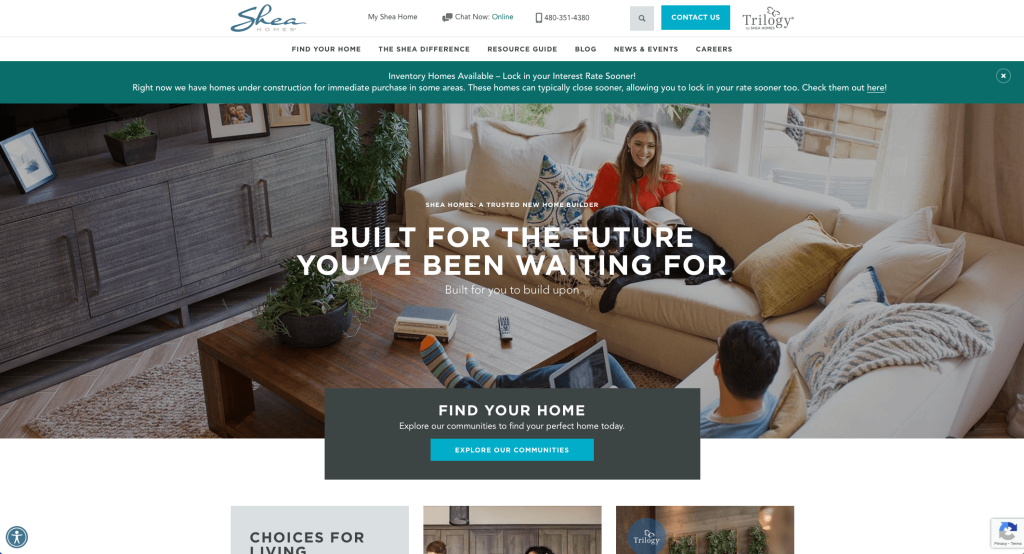
This is a great website design idea for a builder to see when looking for a custom look and feel for their next web design template. The images used to separate categories and guide viewers to other areas within the site was probably the most impactful feature in the homepage of Shea Homes. This clean home builder site also does a good job with the edition of a blog to their site. They clearly had a focus on website usability when designing the well organized navigation bar for their website. Give some thought to the unique design of this home builder website when developing your next custom website.
18. Ellis Don
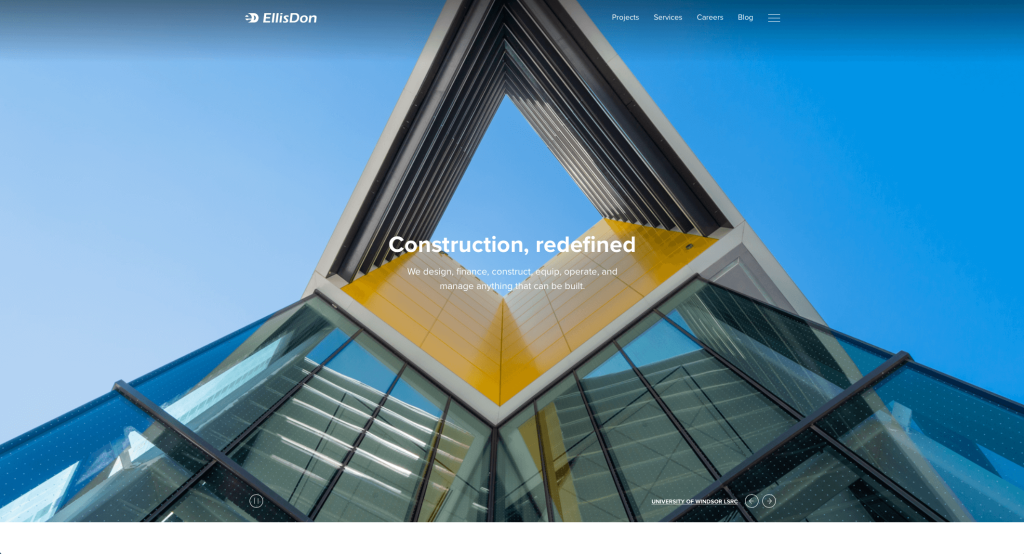
This is a great web design example for home builders looking for a professional website. As you scroll through the homepage of this website, one of the design qualities you’ll notice is their smooth transitions. Their updated news section was another design quality of this professional home builder site we enjoyed. From a marketing perspective, we really liked the way this builder website utilized a dark background with light colored text. Don’t forget to check this website out while looking through our list of the best home builder websites!
19. Artistree Home
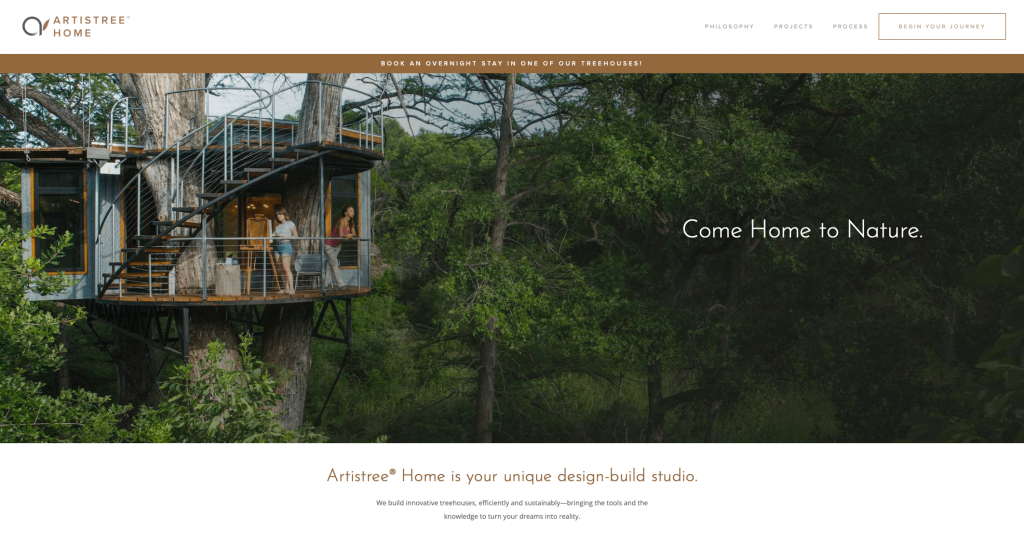
Sporting a clean and intuitive layout, this site keeps things simple for a home builder website. We thought this website was a good example for home builders because of their brown and white color scheme that was relevant in not only their page but also their imagery. This custom home builder site also does a good job with their thought-provoking logo. The domain for their website that matches their company name helped make this one of the best builder websites we looked at. Be sure to consider the creative design of this home builder website when building out your next website.
20. Ivory Homes
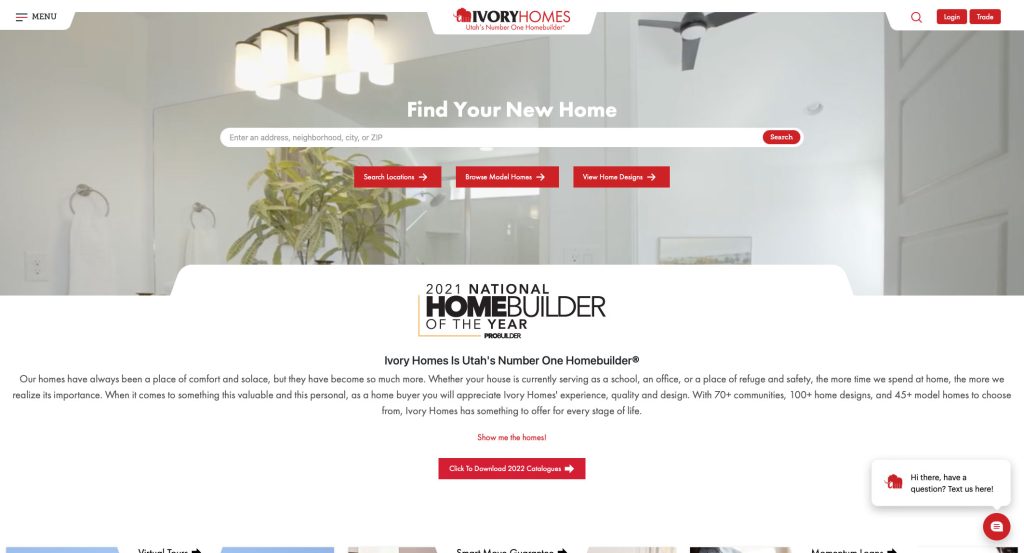
This is a great website design example for home builders looking for a custom website. The automatic survey to help you find a home suitable to you was probably the most impactful feature of the homepage of Ivory Homes. Another feature of this clean home builder site was their professional imagery. Ivory Homes clearly had a focus on website marketing when designing the ability for customers to see the floor plan of their different homes. If you are looking for template ideas for your next home builder website, be sure to check this one out.
21. Stokkers & Company
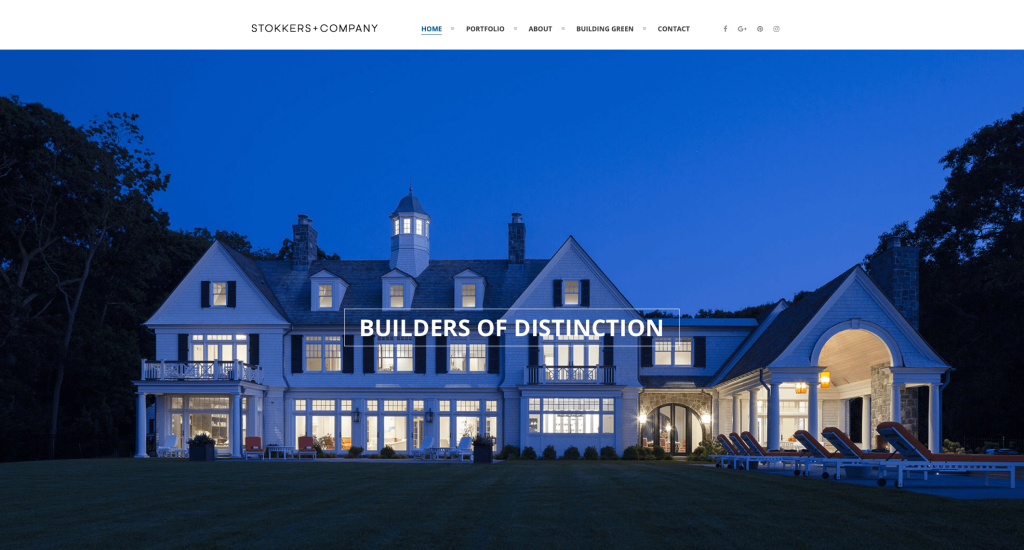
This is a good website example of a template for home builders looking for a custom site design. The display of homes built in different styles was likely the most impactful quality of the homepage of Stokkers & Company. The simple contact information was absolutely a consideration when ranking Stokkers & Company in this list of the most professional home builder websites. From a marketing perspective, we really liked the way this home builder website utilized a clearly labeled menu. What a great website to review when building out your next home builder website!
22. JDG Constructions
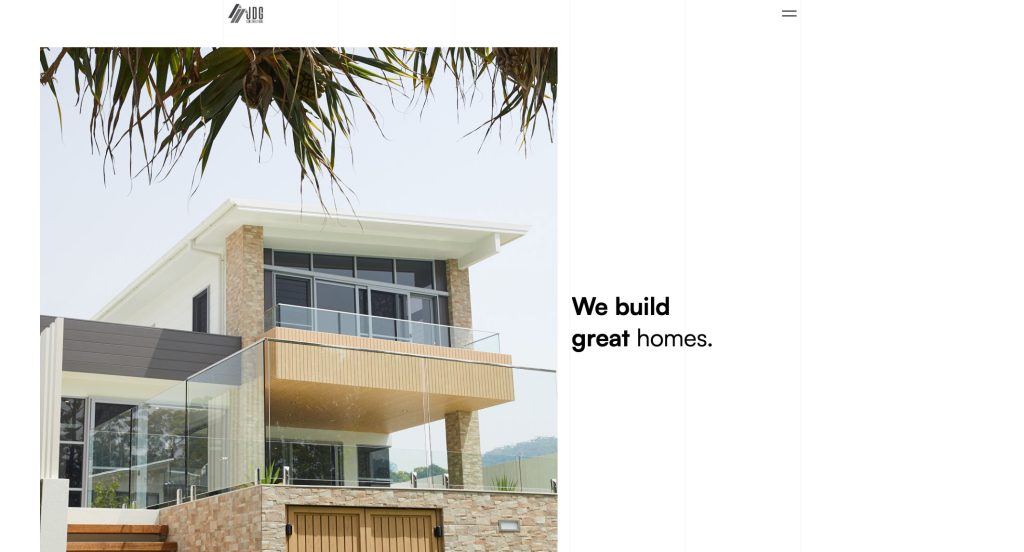
Our team liked the black and white color scheme of the JDG Constructions website, because it allows images to be the focus of the page. Our web designers thought this was a good homepage design example for builders because of their smooth transitions and subtle animations. The creative logo design was another design quality in this custom home builder website we enjoyed. They had website accessibility in mind when designing the well-labeled navigation bar for their website. For builders looking for examples for their next website layout, this example will for sure be one to keep in your back pocket.
23. Connect Homes
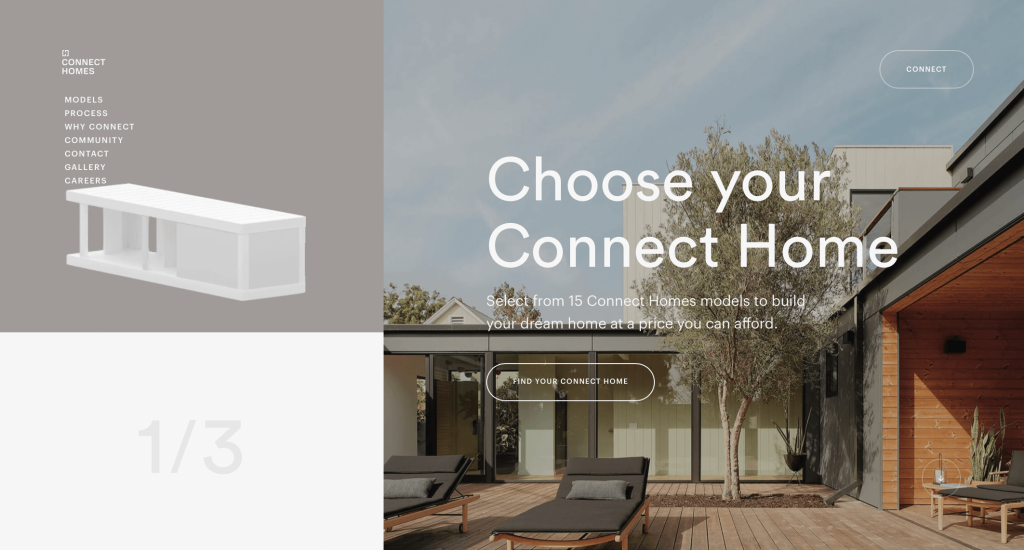
For a home builder website, they did a great job utilizing a color set that fit with their images throughout their site. The simple navigation throughout their site was likely the most impactful quality in the homepage of Connect Homes. The font choice was a nice touch for a professional site. Connect Homes clearly had digital marketing in mind when designing the alluring template for their website. With so many quality reasons to consider this home builder website, it’s no wonder we included it in this list of the best sites!
24. Riverside Homebuilders
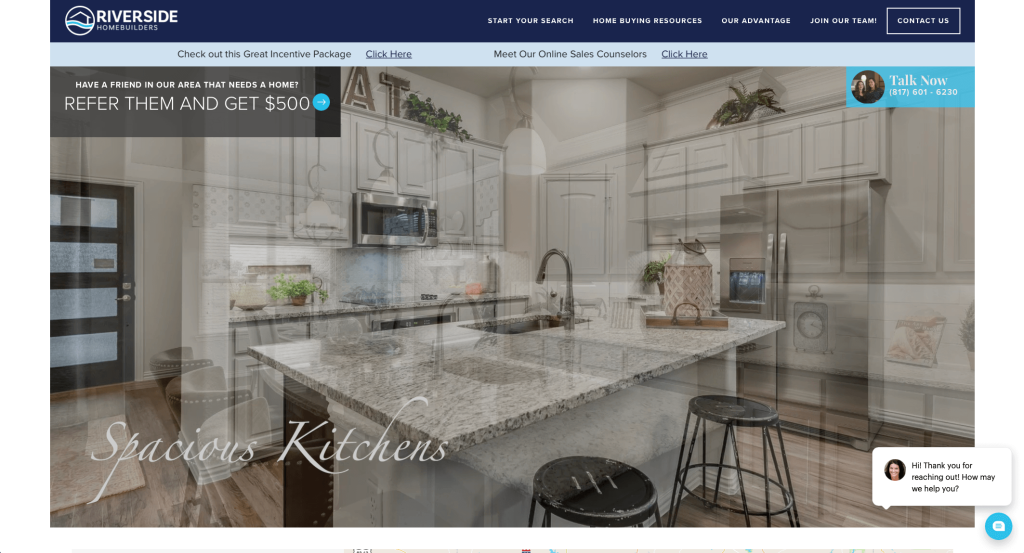
Showcasing a clean and intuitive layout, this website keeps things simple for a home builder site. After scrolling past the header of this home builder website, you’ll notice their monochromatic blue color scheme. The creative logo was another feature of this professional home builder site we enjoyed. The professional text helped make this one of the best home builder websites we looked at. Give some thought to the great design of this home builder website when developing your next custom website.
25. Sweenor Builders
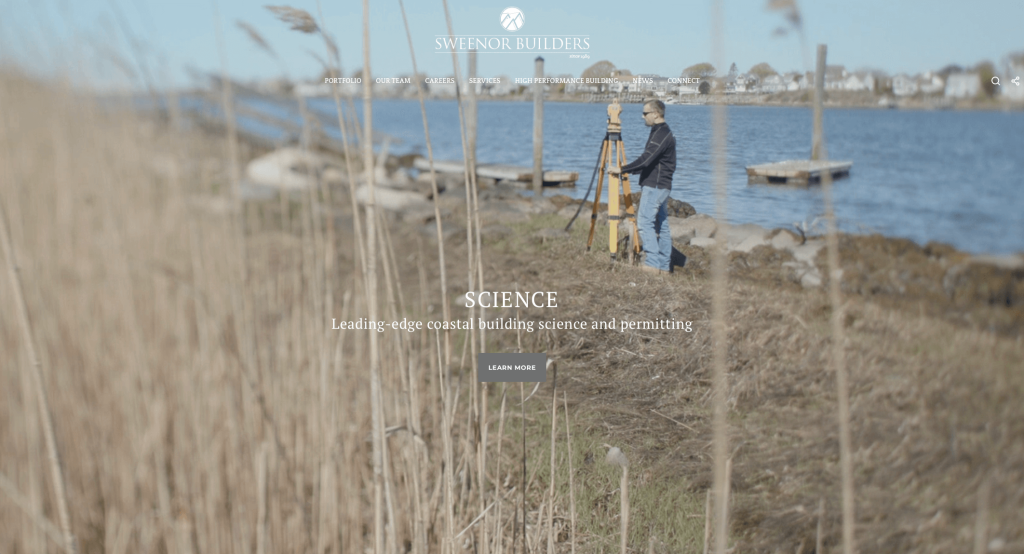
This is a great website design example for a home builder looking to get inspired for a custom layout. After scrolling past the header of this home builder site, you’ll immediately notice their well organized layout. The high-quality visuals were a great choice for a custom home builder website. Sweenor Builders had website usability in mind when designing the buttons to enhance usability throughout their website. Talk about a great website to have included in this list of top home builder websites!
26. Mike Schaap Builders
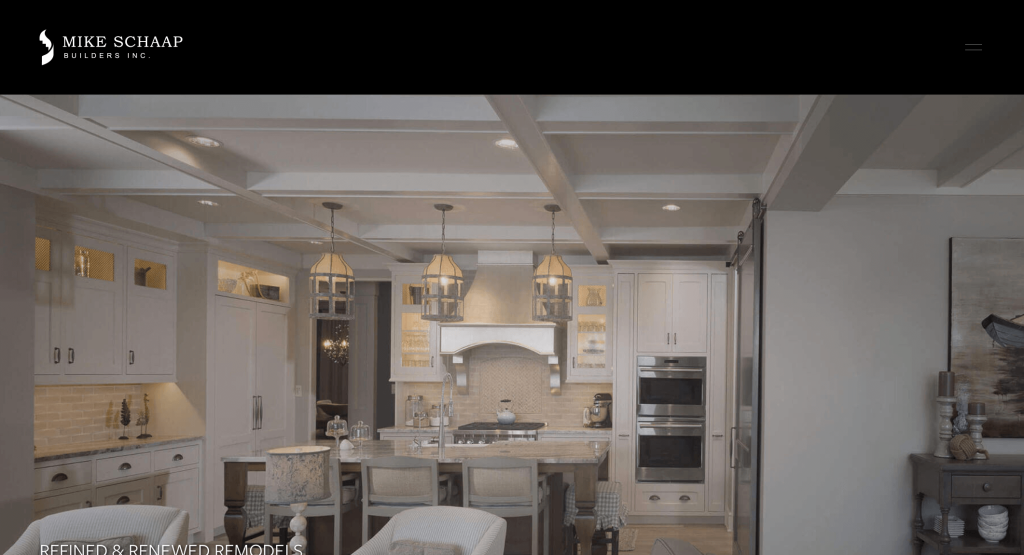
This is a good example of a website design for home builders looking for a professional website layout. As you scroll through the homepage, one of the design qualities you’ll notice is their use of different fonts that looked great when paired together. The alternating color blocks was definitely refreshing for a professional home builder site. They clearly had website usability in mind when designing the simplistic template for their website. Don’t forget to check this website out while looking through our list of the best home builder websites!
27. Virtue Homes
Related: Consider implementing a digital marketing strategy to improve lead generation, email marketing, and reputation management of your home building company.
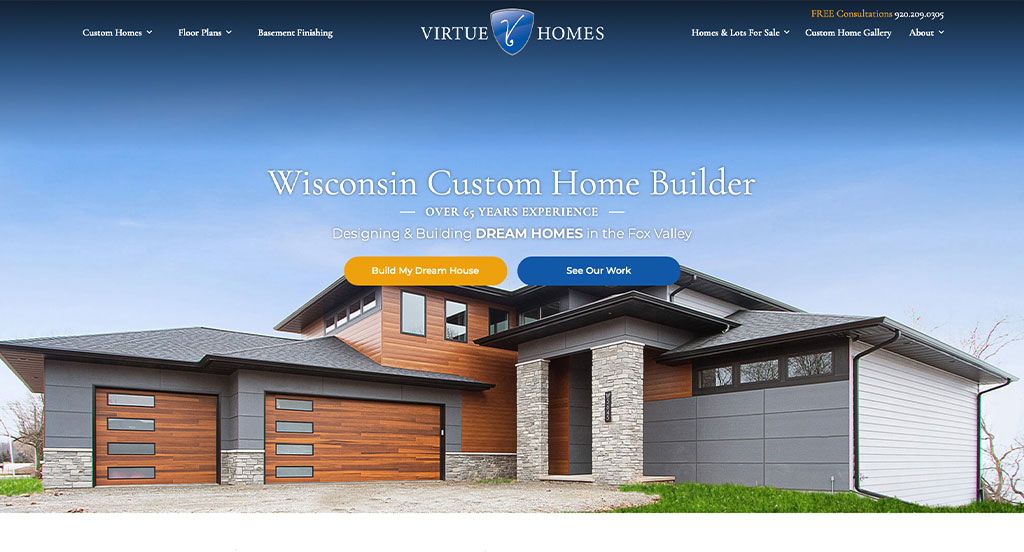
We liked how this home builder website combined the colors of white, black, orange and blue to create a custom web design. The most refreshing part of this builder website was the optimized content. The information that was clearly labeled for each house was refreshing for a professional home builder website. The well organized navigation bar helped make this one of the top home builder websites we considered. Any website designer mocking up websites for home builders will want to consider checking this website out.
28. Richmond American Homes
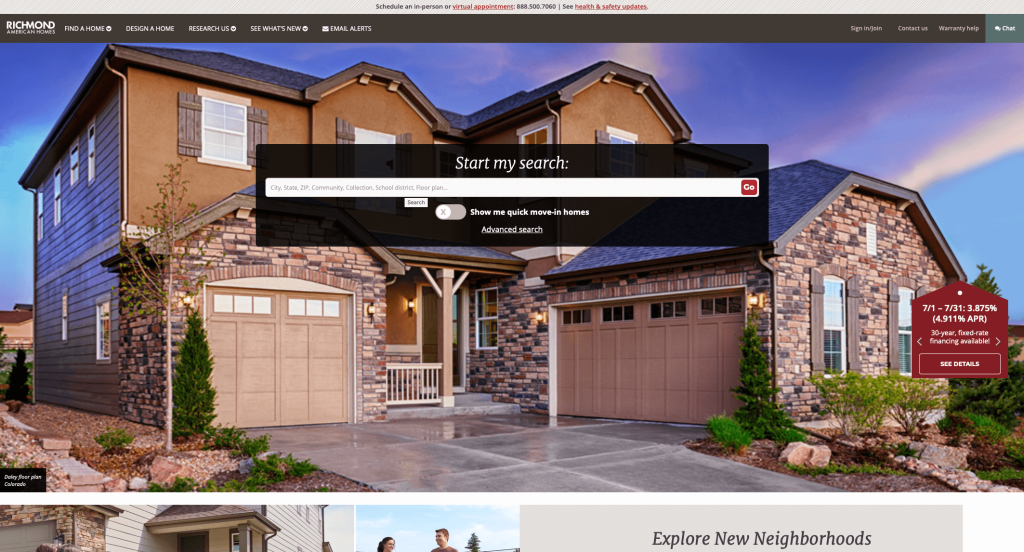
The neutral color palette for this home builder website stood out to us because it lets the colors in their images determine the feel of the page. The staggered alignment for their images and text was definitely the most impactful quality in the homepage of this website. The use of buttons to enhance usability was a unique choice for a custom home builder website. Richmond American Homes clearly had a focus on website marketing when building the domain for their website that matches the company name. Be sure to consider the great design of this home builder website when building your next website.
29. M&M Custom Homes

This is a good example of a home builder website design for a person looking for a professional look and feel. The large imagery was likely the most impactful quality of the homepage for M&M Custom Homes. This professional home builder website also does a good job with their clearly labeled menu. They had digital marketing in mind when creating the balance of white space within their website. For home builders looking for examples for their next website layout, this example will for sure be one to keep in your back pocket.
30. Highland Homes
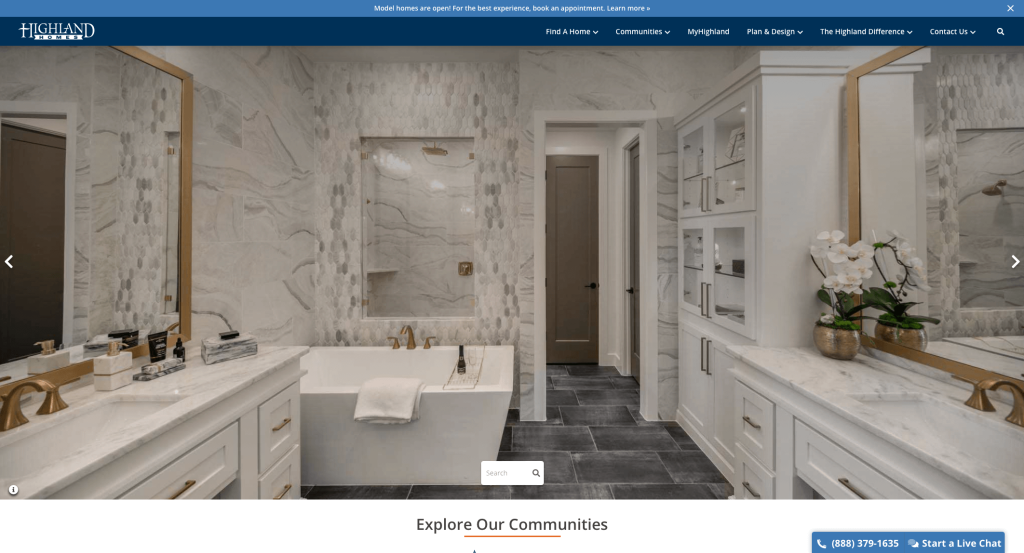
This is a good example of a website design for home builders looking for a professional layout. The blue color scheme was likely the most impactful feature in the homepage of this website. Their loading graphic was simple but the thought was refreshing for a custom home builder site. They had website usability in mind when building the simple contact information for their website. If you are looking for template options for your next home builder site, be sure to check this one out.
31. The New Home Company

This is a good example of a web design for home builders looking for a custom layout. As you scroll through the homepage of this website, one of the qualities you’ll notice right away is their subtle animations. This creative home builder site also does a good job with their professional font. They clearly had a focus on website accessibility when designing the template for their website that was easy to use. You won’t be disappointed after reviewing this website for design ideas for your next website!
32. Bill Huey + Associates
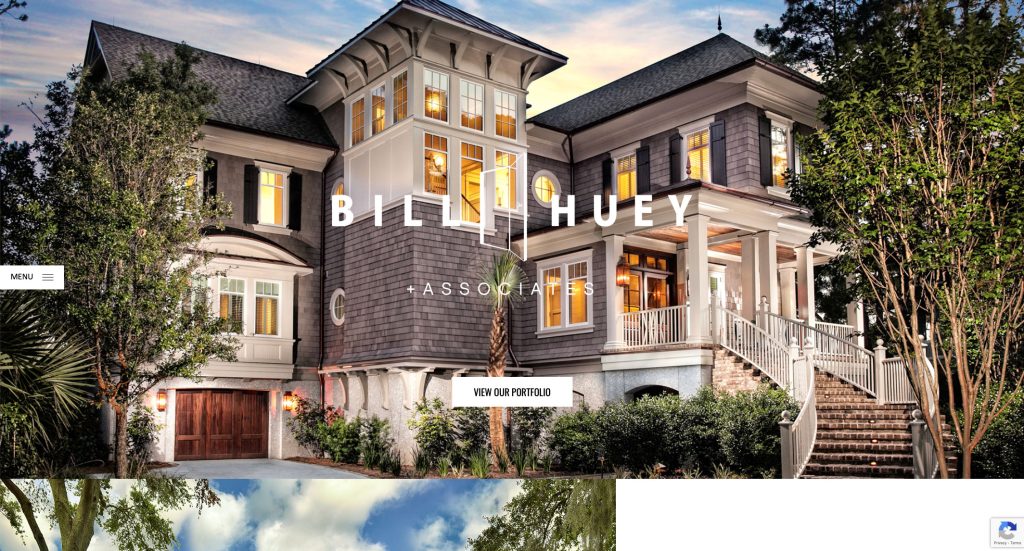
This is a good example of a web design for home builders looking for a custom look and feel. The full-screen imagery was probably the most impactful quality in the homepage of this website. Their portfolio was a nice touch for a custom website. The well-labeled navigation bar helped make this one of the best builder websites we looked at. With so many quality reasons to consider this home builder website, it’s obvious why we included it in this list of the best sites!
33. Wausau Homes
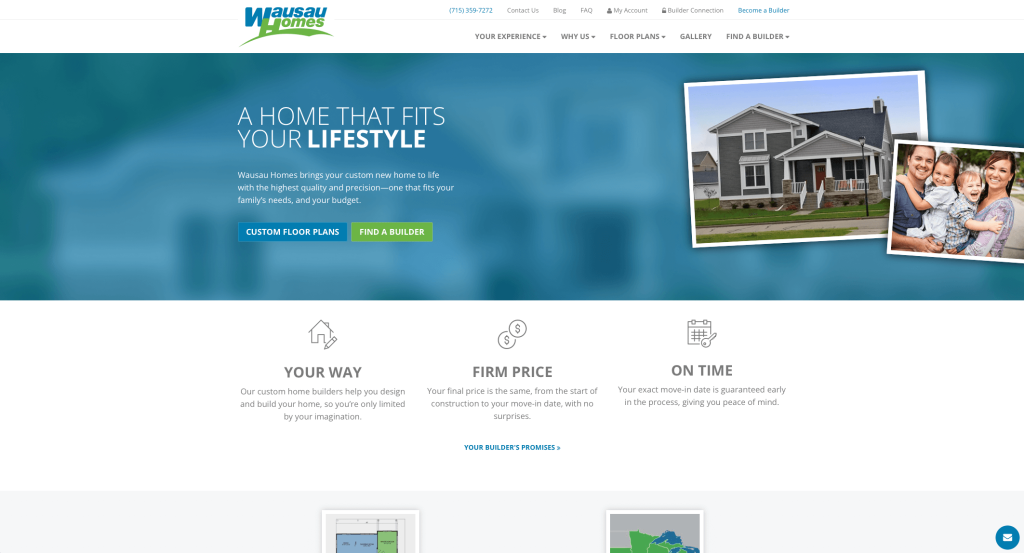
Wausau Homes has a well-designed home builder website that uses a white, green and blue color palette, which we like because it’s simple but catches the eyes of viewers. After scrolling past the header of this builder website, you’ll notice their simple icons. The ability to search their floor plans within this website helped make it into our list of the best websites for home builders. The graphic drawn up in color as a preview of what floor plans will look like helped make this one of the best builder websites we considered. Be sure to consider the unique design of this home builder website when developing your next website.
34. Cover
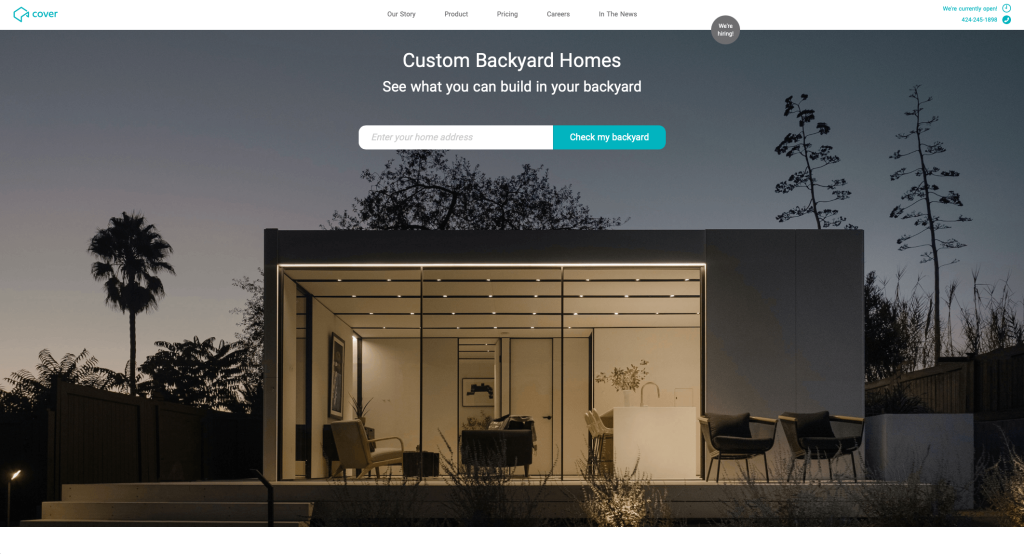
The Cover website has a very professional feel to it, thanks to its blended use of white, black and blue. The reviews by other companies was definitely the most impactful quality in the homepage of this website. The buttons to enhance usability was a nice touch for a unique site. They clearly had website accessibility in mind when creating the cover in the news portion of their website. For the builders out there looking through website examples, make sure to check this one out!
35. Ryan Homes
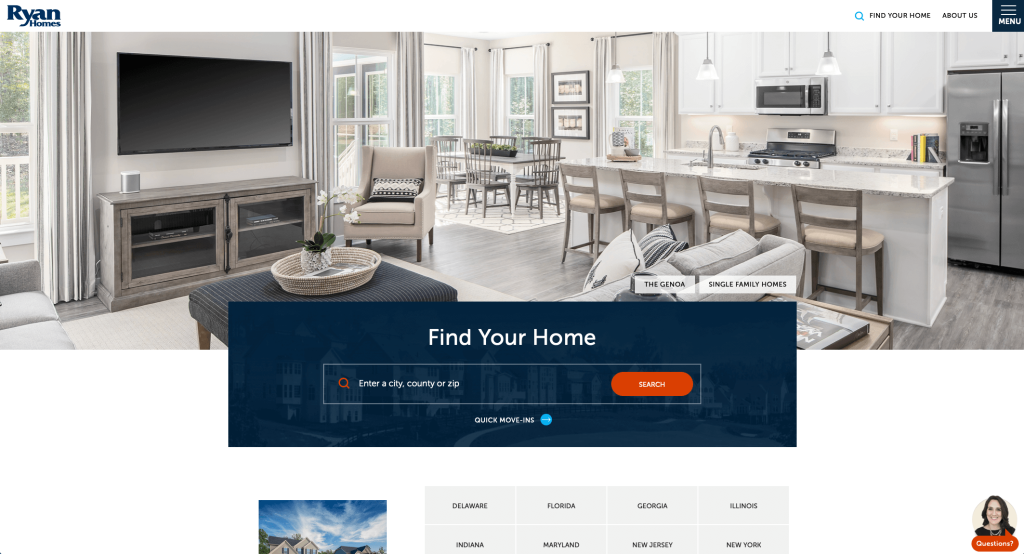
We appreciated how this home builder site used the colors of white, blue and orange to create an attractive website layout. One of the design features we liked most on the homepage of Ryan Homes was the survey to help you find a home matching your price range and square footage preferences. The simplistic template was a nice touch for a unique builder site. Ryan Homes clearly had a focus on website marketing when designing the domain for their website that matches the company’s name. Any website designer building websites for home builders will want to consider checking this website out.
36. Stylecraft
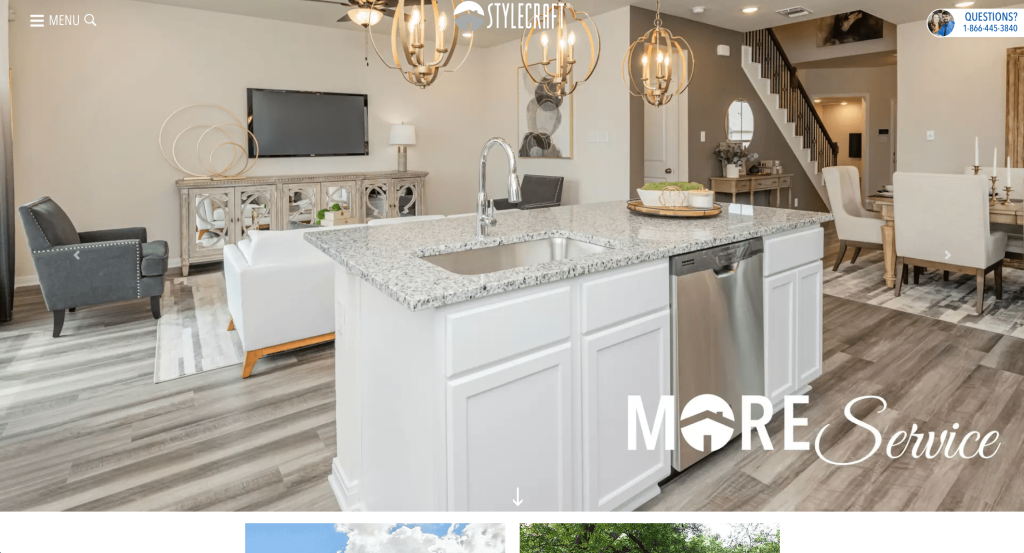
We appreciated how this home builder website used the colors of blue, white, gray and black to create into a custom web design. The part of this website’s homepage that caught our attention was definitely their different textures for the backgrounds. Another thoughtful quality in this custom home builder site was the well organized menu. They clearly had a focus on website marketing when building the interesting logo for of their website. Give some thought to the unique design of this home builder website when developing your next website.
37. Thomas James Homes
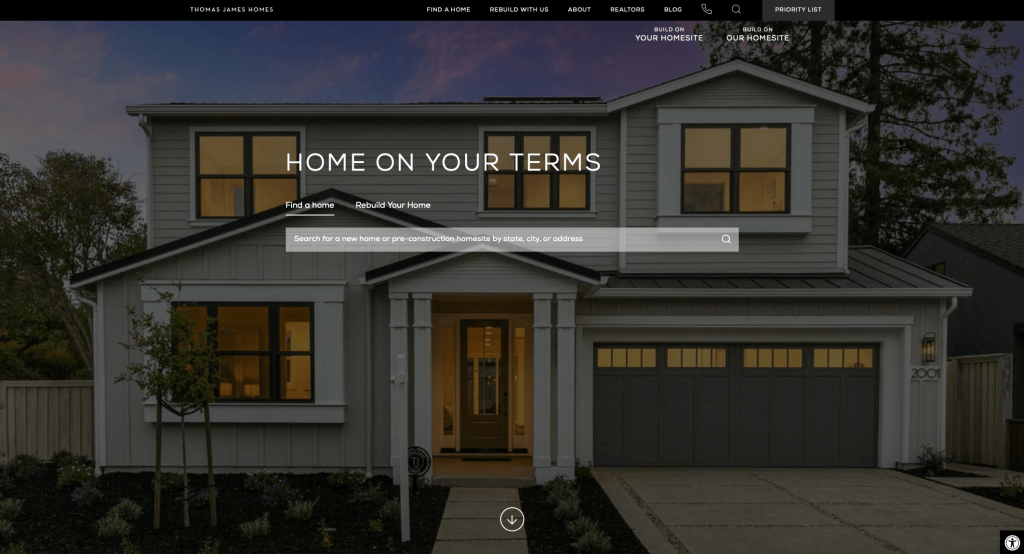
The black and white color palette of this custom home builder website stood out to us because it once again allowed for images to be the main focus. One of the homepage features in the Thomas James Homes website we noticed was their striking logo design. Another thoughtful quality in this professional home builder website was their buttons to ensure simple navigation. From a marketing viewpoint, we really liked the way this home builder website utilized icons throughout their site. If you are looking for template examples for your next home builder website, be sure to check this one out.
38. California Home Builders

We quickly noticed the white and dark blue color scheme of the California Home Builders website, which we liked because it helps the website feel more spacious. The information that was well organized was likely the most impactful quality in the homepage of this website. Another feature of this clean home builder website was their high-quality imagery. The clearly labeled menu helped make this one of the top home builder websites we considered. Don’t skip past this website when hunting for design ideas for your next home builder website!
39. Canyon Design Build
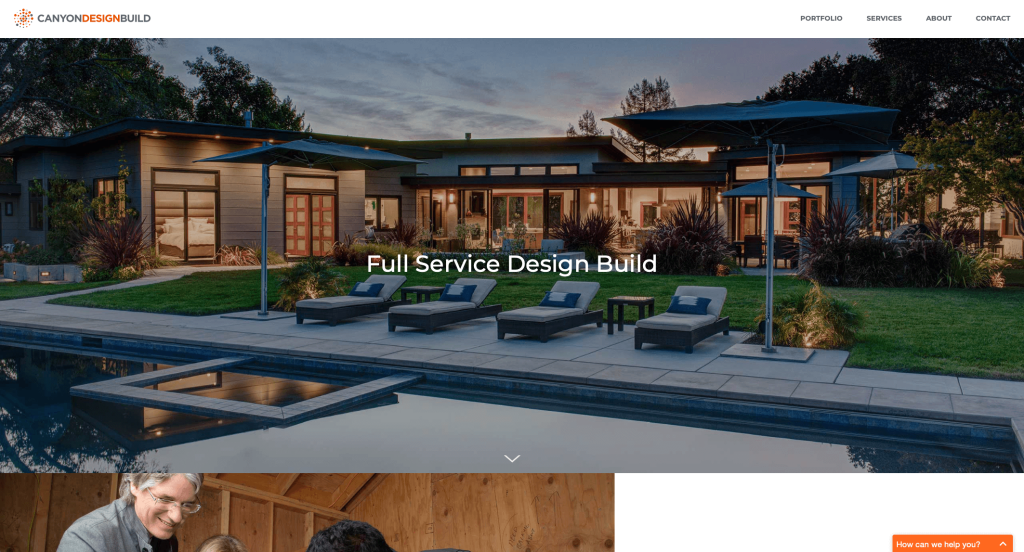
We liked how this home builder website combined the colors of white, orange and gray into a custom web design layout. After scrolling past the header of this home builder website, you’ll immediately notice the interesting logo design. Another thoughtful quality in this creative builder site was the staggered layout for their text and imagery. Canyon Design Build clearly had a focus on conversions when creating the creative font for their website. For home builders looking for examples for their next website layout, this example will for sure be one to keep in your back pocket.
40. CMK Builders, Inc.
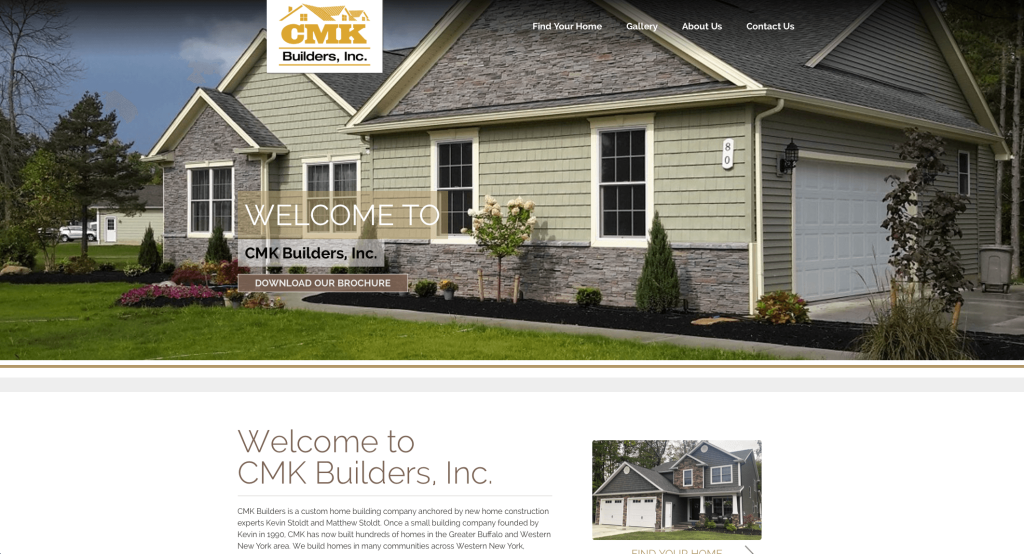
We immediately noticed the white, black and accented yellow color scheme of the CMK Builders, Inc. website, which we liked because it looks professional. Of all the custom home builder websites we reviewed, one of the features in this custom website we liked was their well labeled navigation bar. Another thoughtful quality in this creative builder site was the ability to look through their gallery based on room type. From a marketing point of view, we really liked the way they utilized a contact page. What a great website to review when designing your next home builder website!
41. Olson Homes
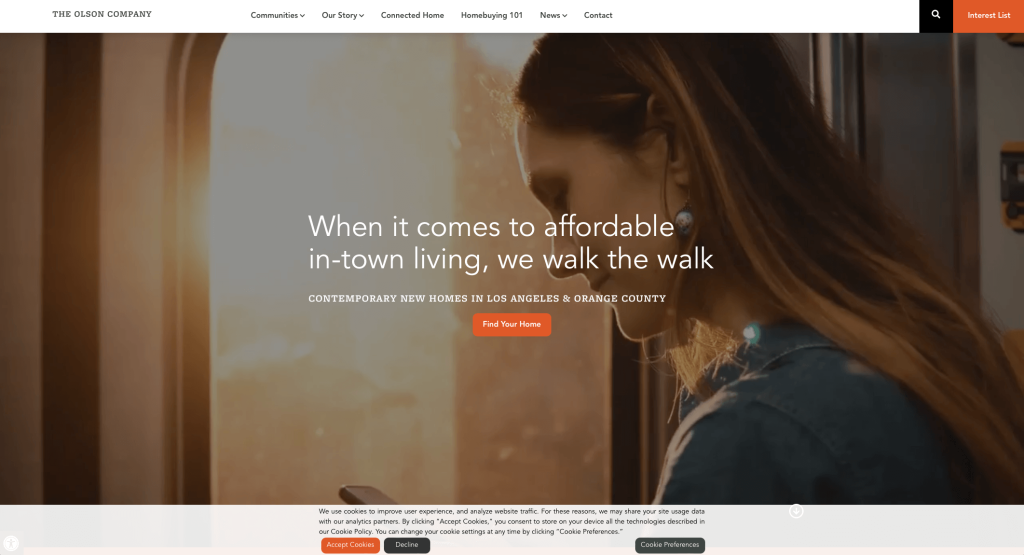
We appreciated how this home builder site used the colors of orange, gray, white and black to create an attractive website layout. The organized template was likely the most impactful quality of the homepage of Olson Homes. The news section was another feature in this professional home builder website we enjoyed. Olson Homes clearly had website marketing in mind when designing the simple navigation throughout their website. Be sure to consider the creative design of this home builder website when developing your next custom website.
42. Sierra Classic Custom Homes
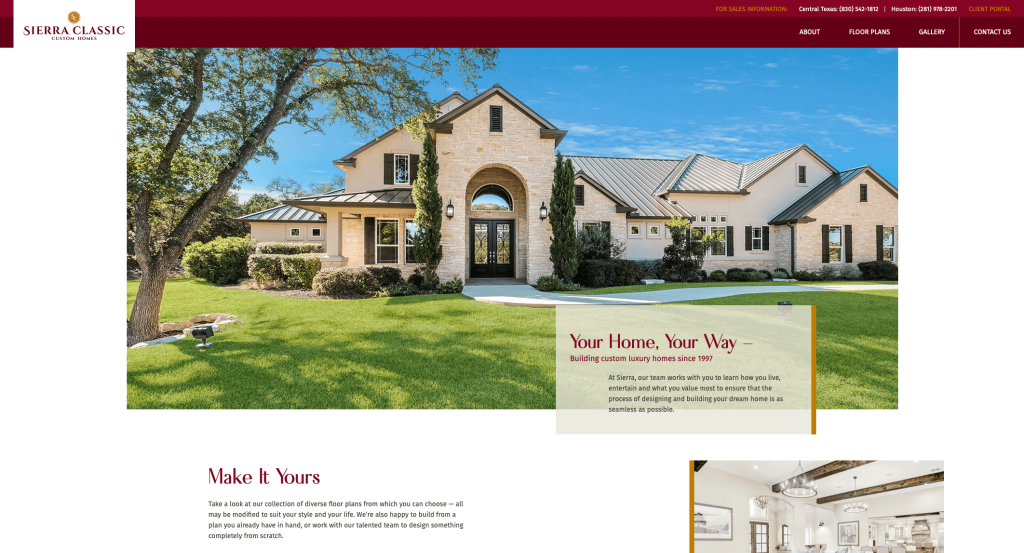
This is a great website design idea for a builder to see when looking for a custom look and feel for their next web design. We thought this was a good homepage design example for home builders because of their large visuals. The buttons that lead to other areas within the site was a nice touch for a professional site. They had conversions in mind when creating the domain for their website that matches their company name. Give some thought to the creative design of this home builder website when building your next website.
43. Pulte Homes
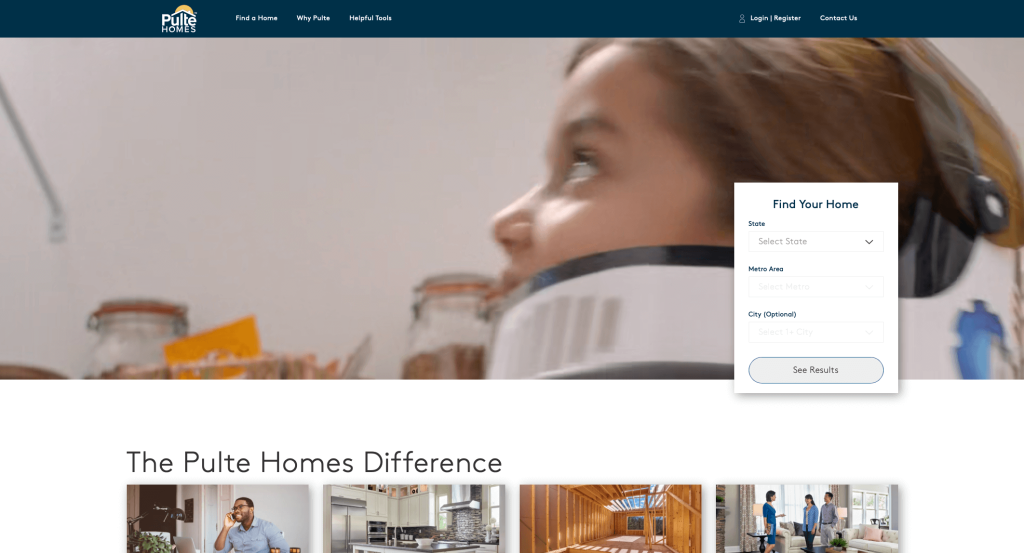
We liked how this home builder website combined the colors of gray, blue and white to build a custom web design. We thought this was a good homepage design example for home builders because of their bulleted information. Another design quality in this custom builder site was their unique logo design. Pulte Homes had website accessibility in mind when creating the clearly labeled menu for their website. With so many great reasons to consider this home builder website, it’s no wonder we included it in this list of the best websites!
44. Maronda Homes
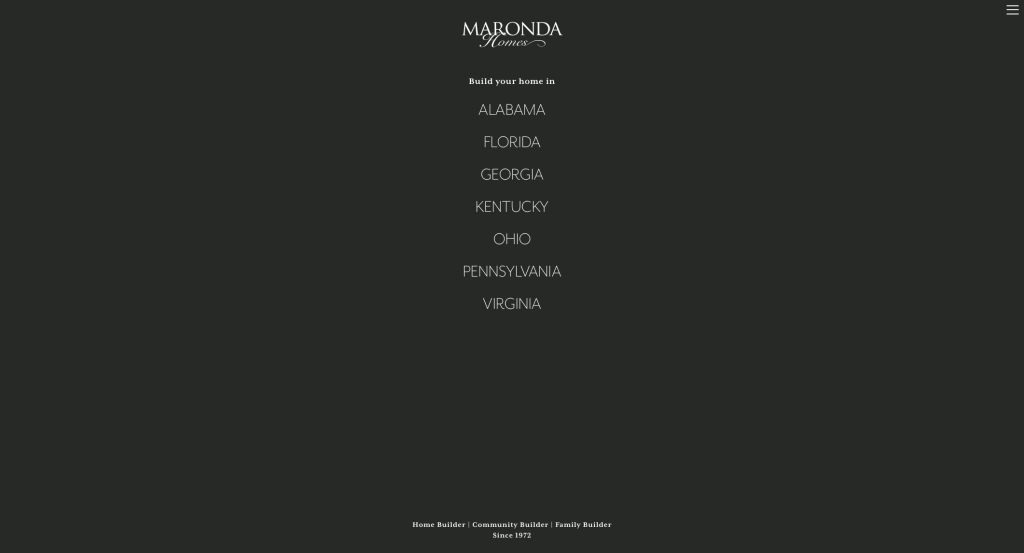
We liked how this home builder site combined the colors of green, white and gray into an attractive website layout. The automatically playing video for the background was definitely the most impactful quality in the homepage of Maronda Homes. The ability to look at the homes location on the map without leaving the site was definitely refreshing for a unique home builder website. Maronda Homes clearly had ease of use in mind when designing the search bar within each state when looking for homes on their website. Don’t forget to check this website out while looking through our list of the best home builder website layouts!
45. Lexar Homes
Related: Rank higher in search results when people are looking for home builders in your area.
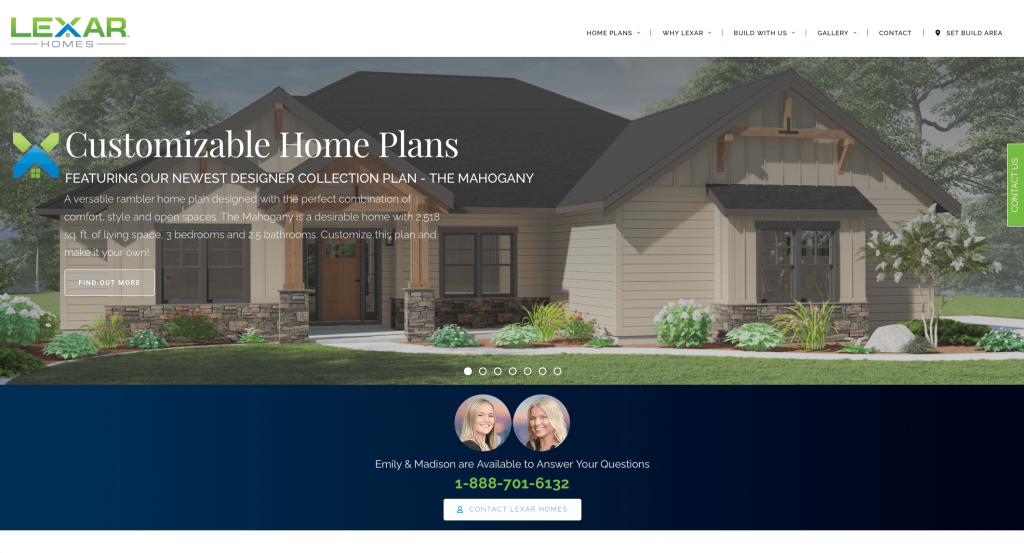
The website of Lexar Homes ranked because it’s one of the nicer home builder websites we reviewed. Of all the custom home builders websites we reviewed, one of the features in this custom website we liked was their logo that included their company name. The icons to help viewers read the logistics of homes was another thoughtful feature of this custom home builder site we enjoyed. They had ease of use in mind when designing the creative font for their website. So many attractive qualities to consider when ranking this website.
46. Lexington Homes
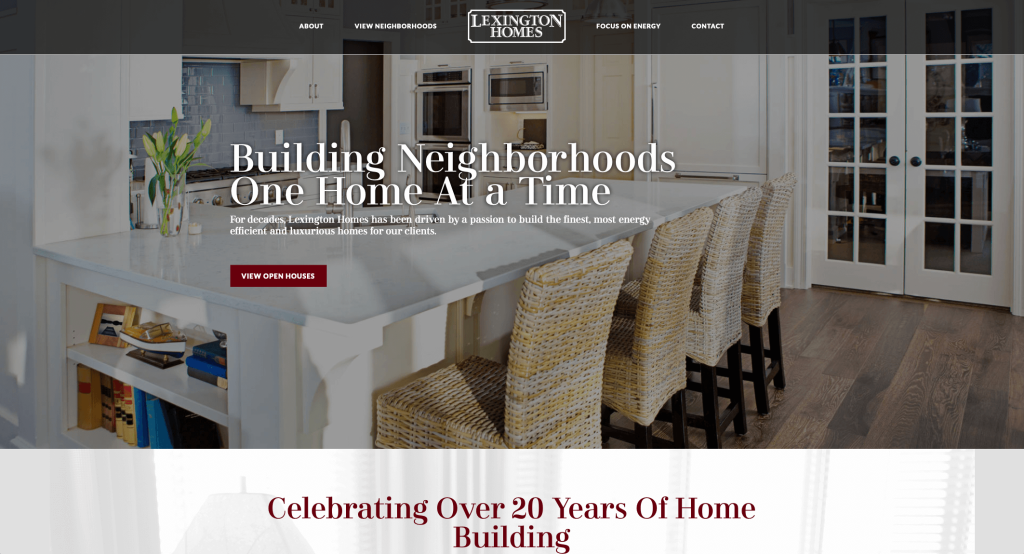
This is a good example of a web design for home builders looking for a custom layout. After scrolling past the header of this home builder site, you’ll immediately notice the use of images for the website’s background. Another thoughtful quality in this custom home builder website was the ability to learn more about them along with seeing their work. Their bulleted information helped make this one of the top home builder websites we looked at. Don’t scroll past this website when considering design ideas for your next builder website!
47. D&W Homes
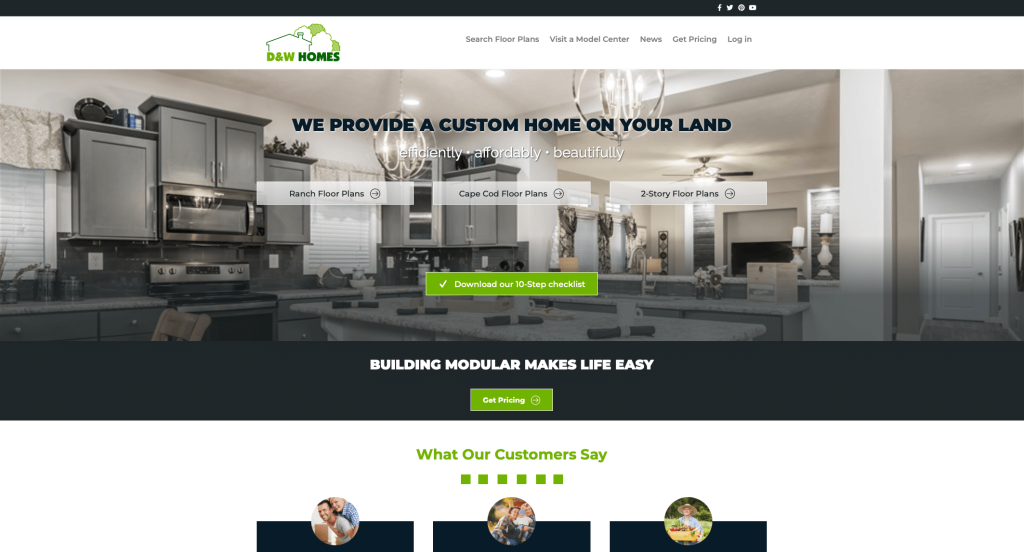
This is a great website design example for home builders looking for a custom website. As you scroll through the homepage of the website, one of the qualities you’ll notice right away is their interesting logo design. The customer reviews section was another reason why we included this website in our rankings for the top web design ideas for home builders. D&W Homes clearly had website marketing in mind when designing the well labeled navigation bar for their website. Be sure to consider the great design of this home builder website when developing your next custom website.
How to Build a Great Home Builder Website
Are you in the process of building a new website for your home building company? How exciting!
Let’s go through some of the most important steps in building a new, or redesigning an existing, home builder website.
Feel free to skip the first few sections if you already have a domain name, hosting service, and website platform selected!
1.) Selecting a Domain Name
Choosing a domain name for your home builder website is a crucial step in establishing your online identity. It serves as the address that visitors will use to access your website and plays a significant role in branding and recognition of your company.
Here’s a step-by-step process to help you choose the perfect domain name:
- Brainstorm: Start by generating ideas for your domain name, considering your company name, the type of homes you build, and your location.
- Simplicity: Try to keep your domain name simple, easy to spell, and pronounce. Avoid using complex words, hyphens, or numbers.
- Consistency: If your business has an established brand name, it’s generally a good idea to include it in your domain name. For example, if your business name is Mark & Sons Builders, avoid registering a domain name like BestHomesAround.biz.
- Availability: Check the availability of your desired domain names before proceeding. Many common domain names have already been registered. If that’s the case, check if your desired domain name is being used and available for purchase. However, be cautious not to invest a significant amount of money in buying a domain name that is for sale.
- Domain Extensions: Consider which domain extension best suits your website’s purpose. While .com is the most common and widely recognized extension, there are other options available, such as .net, .org, or industry-specific extensions like .homes.
- Legal Considerations: Before registering your domain name, it’s important to conduct a trademark search to ensure that your chosen name doesn’t infringe upon someone else’s intellectual property. For example, avoid registering a domain name that includes another home builder’s business name or the name of a popular construction company.
- Register the Domain: Once you’ve settled on an available domain name, it’s time to register it through a reputable domain registrar. We have found GoDaddy and Namecheap to be the easiest domain registrars to manage.
2.) Selecting a Website Platform
After figuring out your domain name, the next step is selecting a website platform for your home builder website.
Most home builders are going to develop content-based websites with spec home galleries, appointment calendars, phone numbers, and contact forms to drive conversions.
WordPress is often an excellent platform choice. However, there are also options like Wix and other hosted website builders.
- WordPress: WordPress is a versatile and widely used content management system (CMS) that offers tremendous flexibility and customization options. It caters to all types of home builder websites, from simple informational sites to more complex sites showcasing project galleries and client testimonials. With a wide range of themes and plugins available, WordPress allows you to create a highly customized website tailored to your home building company. It’s an ideal choice if you value control and want the ability to expand your website’s functionality over time. Although there is a hosted version of WordPress, most users prefer the open-source version installed on a web hosting account.
- Wix: The Wix platform is similar to WordPress. It provides comparable page-building features and is also a hosted solution. We have worked on home builder websites built with Wix and found it to be a capable page builder. With Wix, you won’t need a separate web hosting service.
It isn’t common to see ecommerce functionality on a home builder’s website.
Web Hosting Requirements
If you choose a platform like WordPress or WooCommerce, you’ll need to find a web hosting service.
Allow us to suggest our own web hosting service, which is excellent for WordPress websites. Alternatively, consider these recommendations for reliable web hosting services from other hosting companies:
- WP Engine: This is one of our preferred web hosting services for home building businesses. WP Engine offers a great control panel that simplifies the creation of staging websites. Their backup process is also seamless. The only drawback we’ve encountered is the limits they place on PHP max_execution_time. Keep in mind that their pricing increases quickly if you require upgraded services.
- SiteGround: We have always enjoyed working with SiteGround. Their live chat and email support are excellent compared to more well-known hosting firms. We have never experienced long wait times when contacting their support, and the first person we interacted with usually resolved the issue. Their backup tools are user-friendly, and they offer reasonable pricing for home builders.
- Digital Ocean: This is a great option for cloud hosting, although it may be too advanced for most home builder websites. We have not encountered any issues with the Digital Ocean cloud network, unlike other cloud networks we have tried. Keep in mind that cloud hosting can be expensive when factoring in droplet (server instance) costs, as well as operating system, control panel, server software, offsite backup, and server management fees. For server administration recommendations, check out AdminGeekZ.
3.) Selecting a Website Template
Most home builders prefer to purchase and customize a pre-designed website template, as it significantly reduces the cost and time required for web development. However, if your home building business prefers a custom design, you can always hire a custom web developer or custom ecommerce developer to build a unique theme from scratch.
For the purpose of setting up a home builder website, let’s focus on suggestions for finding a pre-built website template. Here are some links to the main theme marketplaces to consider:
WordPress Home Builder Themes
You can find free themes at wordpress.org or explore home builder templates on ThemeForest.
BAUEN – Themeforest
$59
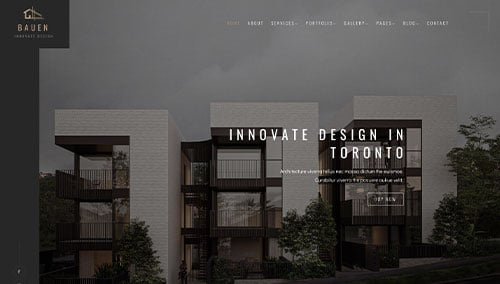
Buildnox – Themeforest
$49
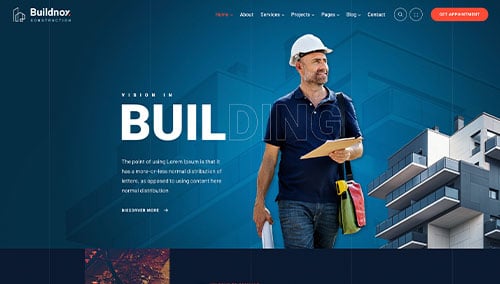
Constructo – Themeforest
$59
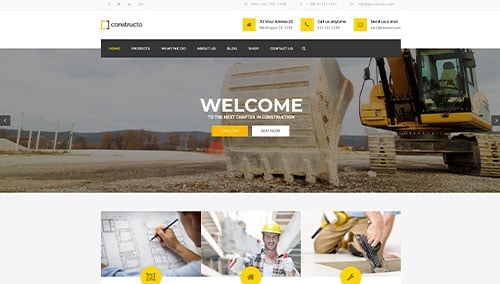
Builty – Themeforest
$49
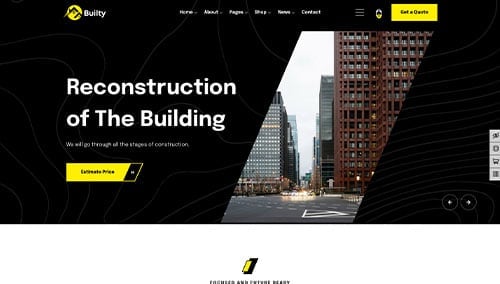
Wix Home Builder Themes
Browse free and paid themes available in the Wix marketplace at wix.com, some of which are suitable for home builders.
4.) Creating Content & Adding Images
Now that you have your domain name, website platform, and theme sorted out, it’s time to start building content for your home builder website!
Here are some useful tips to help you craft engaging and effective website copy:
- Know your target audience: Before writing, have a clear understanding of your target audience’s demographics, preferences, and needs. Tailor your content to address their pain points, offer value, and resonate with them. This will enhance your visibility in search engines for home builder-related queries relevant to your business.
- Define your key messages: Determine the main messages you want to convey through your website content. These should align with your brand, showcase your unique advantages, and clearly communicate the benefits of choosing your home building services.
- Keep it concise and scannable: Online readers tend to skim content, so keep your writing concise and easy to digest. Use short paragraphs, bullet points, subheadings, and bold text to break up the content and improve readability.
- Create clear and compelling headlines: Craft attention-grabbing headlines that immediately convey the value and relevance of your home builder business. A well-crafted headline can entice visitors to explore your website further and learn more about your services.
- Incorporate keywords strategically: Research relevant keywords and naturally integrate them throughout your content. This can boost your home builder website’s visibility in search engine results. However, avoid keyword stuffing, as it can harm readability and user experience. Tools like Ahrefs or Semrush can assist with keyword research.
- Maintain a conversational tone: Write in a conversational style that resonates with your target audience. Avoid jargon or overly technical language unless it’s necessary for your specific audience. Engage your readers by addressing them directly and using a friendly, approachable tone.
- Edit and proofread: Always review and proofread your content before publishing. Check for grammar, spelling, and punctuation errors. Ensure the flow of your content is smooth and logical, aligning with your brand voice and style guidelines. Tools like Grammarly can be helpful!
- Utilize ChatGPT for assistance: If you need ideas or help refining the content on your home builder website, consider leveraging AI tools like ChatGPT.
Additionally, you’ll want to enhance the visual appeal of your content by incorporating relevant and high-quality images. Consider the following tips:
- Choose high-quality images: Opt for visually appealing and well-composed high-resolution images. Blurry or pixelated images can diminish the overall quality of your home builder website.
- Ensure relevance: Select images that are relevant to your content and help illustrate your message. The images you use should complement the text and provide additional context or visual interest to showcase your home building projects.
- Explore stock photo resources: Utilize reputable stock photo websites such as Unsplash, Pixabay, or Shutterstock to discover a wide range of professional-quality images relevant to the home building industry. Be mindful of licensing requirements and provide proper attribution when necessary.
- Customize images when possible: If you have the skills or resources, consider customizing or branding images to align with your home builder brand. This can create a cohesive visual experience for your visitors. Tools like Adobe Photoshop or Canva can be utilized for customization.
- Optimize image file sizes: Compress images to optimize their file sizes without compromising quality. Large image files can slow down your home builder website’s page speed, affecting user experience and SEO. Tools like TinyPNG can assist with image compression.
5.) Post Launch Tasks
Once you have built and launched your home builder website, there are several important tasks and services to consider for maximizing its effectiveness. Here are some essential suggestions to help you navigate post-launch activities:
- Search Engine Optimization (SEO): Implementing SEO strategies is crucial for improving your home builder website’s visibility in local search results. Conduct keyword research, optimize your content, and ensure your website has a solid internal linking structure. Regularly update and create fresh, high-quality content to attract organic traffic. Consider hiring our SEO team or explore third-party providers like The HOTH.
- Paid Advertising: For quicker results in driving traffic, consider utilizing paid advertising platforms like Google Ads or Facebook Ads to target specific audiences for your home builder business. You can hire our PPC management services or find skilled professionals on websites like Mayple.
- Conversion Rate Optimization (CRO): Analyze your home builder website’s performance and user behavior using tools like Google Analytics. Identify areas where users may drop off or face barriers to conversion. Conduct A/B testing with tools like VWO to make data-driven changes and improve your website’s conversion rates and overall user experience.
- Website Security: Safeguard your home builder website from malware and other security risks. Implement robust security measures such as SSL certificates, web application firewalls (like Sucuri), and regular backups. Keep your CMS, plugins, and themes up to date to minimize vulnerabilities. Monitor your website’s uptime with services like UptimeRobot.
- Website Maintenance: Regularly maintain your home builder website to ensure optimal performance. If you are using WordPress, this includes updating plugins and themes, monitoring website speed and performance, and resolving any broken links or errors. Consider hiring our website maintenance services or finding freelancers on platforms like Upwork. Regularly back up your home builder website to safeguard against data loss or technical issues.
- User Feedback and Testing: Actively seek user feedback to understand visitor experiences and identify areas for improvement. Implement user testing to gather insights on how users interact with your home builder website. Use this feedback to make iterative enhancements and continuously optimize the user experience.
- Content Updates: Keep your website content fresh and up to date. Regularly publish new blog posts about home building, update product or service information, and ensure that all information is accurate and relevant. Engaging and valuable content not only attracts visitors but also encourages them to return and share your content with others interested in home building.
Remember, post-launch digital marketing activities are crucial for the long-term success of your home builder website. Stay proactive, monitor performance, and adapt your strategies to achieve your business goals and meet the needs of your audience.
